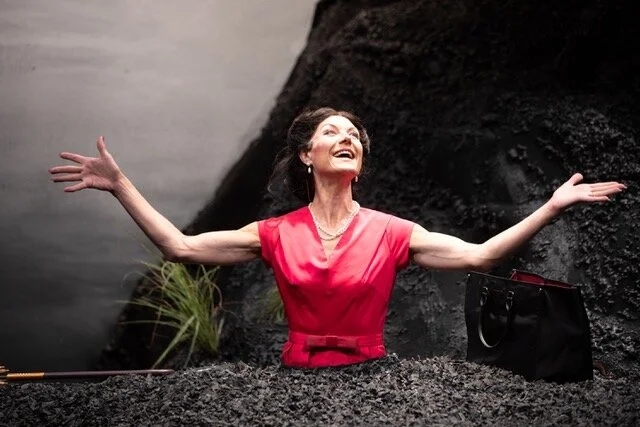Review: 'Happy Days' at Flint Repertory Theatre
(Photo: Mike Naddeo)
There have been times since March 2020 when the world went into lockdown that it has been difficult to remain optimistic. When looking around at the deaths, the social and racial injustice, the petty cruelties and a pandemic that has stretched out far longer than any of us had hoped—it is hard to see life’s “great mercies.”
Perhaps that is why Flint Repertory Theatre chose to open its season with Samuel Beckett’s “Happy Days.” After all, if a woman buried in dirt up to her waist, alone except for a taciturn husband who rarely speaks in anything other than grunts, can greet each day with enthusiasm and label her waking hours as a happy day, perhaps we too can complain just a little less about our lots in life.
Directed by Kathryn Walsh, “Happy Days” falls firmly into the “absurdist” category. Why is Winnie buried to her waist? The play never says. What will happen to her? Well, in the second act, she is buried up to her neck, so things don’t look good. Why is there a loud ringing that awakes her every day and refuses to let her get much sleep? Again, we don’t know.
It’s really not about things making sense. How often have we in the past few years shaken our heads because the way people behave and the things happening in the world make no sense whatsoever?
Walsh has challenges unusual for a director. There isn’t much blocking in a show where the main character cannot move and the supporting character is often offstage or has only the top of his head showing. Rather, she must make sure that this two-act play moves along at a pace that won’t lose the audience, but also at one that communicates the sheer drudgery that Winnie overcomes each day.
It helps that her Winnie is played by actor Janet Haley, a regular at Flint Rep and surely one of the finest actresses in the region. Haley perfectly marries the lines with as much movement as she is able—with expressive arm movements in the first act and then just her head in the second. That she remains animated and dignified is a testament to her talent.
She leans into each of the lines, never letting them feel antiquated even though they are spoken by a woman of a different era. Winnie often repeats herself and Haley entertains the audience by hitting each of those lines with the same sort of inflection that underlines the repetitiveness.
Perhaps even more impressive is that Haley makes you believe in Winnie despite how absurd her situation and her response to it is. Haley is genuine even when she is affected. She commands the stage while stuck in it, with only half of her body available as tools for storytelling.
Rico Bruce Wade plays her loving husband, Willie, one who stays with her despite the hostile environment they both find themselves in, but one who has none of her garrulousness. He moves slowly and is absorbed in his newspaper. Unlike Haley, Wade does have some mobility, though it is one that is weighted down with a gargantuan heaviness. While Winnie claims she would float away if the ground were not holding her down, Willie seems to have lost his fight with gravity and is oppressed by the very air.
Scott Penner is the scenic designer who created a threatening black hill with the soil swallowing Winnie up. He peppers it with plastic bottles that make the stage appear to be something out of an old science fiction movie, an alien planet where life cannot flourish. He creates such a bleak landscape that it makes Winnie’s optimism even more fascinating.
Costume designer Kate Nelson decked Haley in a bright red dress, one that made her pop out of the black soil—at least, the top half of her. In contrast, Wade is put into a dull colored suit, one very much a period costume, but one that ensured that the only brightness came from the woman determined to remain an optimist in the worst possible circumstances.
There is something about “Happy Days” that feels very 2021. Watching a woman sink slowly into an inescapable morass while being as determined as possible to stick to a routine, to keep a stiff upper lip and to remain calm doesn’t seem all that strange this year. How many people have we seen do that these past two years? Is this what resilience looks like? Is this what we can expect our world to look like as our inattention to climate change has created an ever-threatening environment? Are we just left to stick to our routines and to hope for the best and to let any little victory make the day a happy one?
Neither Beckett nor Flint Rep tries to provide any of those answers, but they do give us plenty to think about with this compelling piece of theater.
